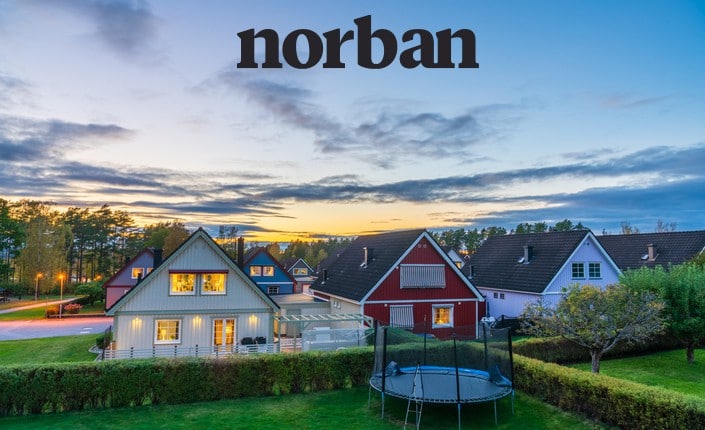
Sweden is not a market we tend to hear a lot about in the real estate marketing industry. It has an entrenched market-leading portal and a well-regulated property market, hardly a breeding ground for disruption.
However, there is one company out there that is shaking up the Swedish housing market and is seeing real traction with an exciting new business model which combines an off-market marketplace with a tech-enabled brokerage.
Having been founded in 2019, Norban recently secured a funding round that will help the startup expand internationally.
We spoke to co-founder Adrian Miller to find out more about how Norban works, the market it operates in and its plans for the future.
Hi Adrian. Norban has a pretty interesting proposition for the customer. Could you explain how it works?
We make it extremely easy, and fun, for homeowners to list their homes for sale.
Homeowners download our app and within minutes they are listed on our marketplace, Pre-Market™. After listing your home you can follow the interest it generates in real-time (including the visits it gets and the ‘followers’ it has), while our brokerage takes over to build a complete listing and take care of potential buyers. The app is your companion throughout the selling process to make the whole experience transparent and smooth.
Norban takes care of every single aspect of the transaction, just like you expect a “traditional” brokerage to do. We employ our own brokers, support team, photographers etc. But we give homeowners the possibility to sell on their own terms before moving becomes urgent.

Adrian Miller, co-founder of Norban
If you get an offer that you are willing to accept on Pre-Market™, great! But you can also decide to list your home on the open market (i.e Hemnet in Sweden).
If you sell your home on Pre-Market, you as a homeowner pay nothing – instead, the buyer pays a 30.000 SEK fixed fee. If you sell your home via the open market you as a seller pay the 30.000 SEK fee, the buyer then pays nothing.
Norban also has no lock-in or exclusivity, meaning that we make it super easy and risk-free to use our service.
So for sellers, we offer a better full-service brokerage service with the added value of being able to test the market and sell if you get the right offer.
The value we create for buyers is that we quite simply increase supply – we have listings for sale that otherwise would not be on the market.
I saw a lot of new build developments on the platform as well. Does the model work the same way with these properties?
The model works the same! We list new build projects on Pre-Market super early to start gathering interest – meaning that we shorten the time to sell homes. Pre-Market is built to make it easy to list properties, and easy to become a potential buyer.
Getting consumers to adopt a new model and way of doing things is notoriously hard. What have been your biggest challenges so far?
Earning trust. Selling a home is a big decision that comes with a lot of financial commitment, anything new is always a bit scary at first.
Norban is designed to create new opportunities and improve a very important service, but we don’t radically change user behavior. As a brokerage service, you get everything you expect from a high street agent – but better. We have been very careful to design an experience that sounds too good to be true.
The other challenge has been communication. Norban combines a marketplace with a brokerage – this is new and people tend to assume things based on how things have worked. So we are faced with the challenge of “educating” consumers.
What is the history behind Norban? Was there an archetypical founder frustration story behind it?
In many ways yes. While I’m not from the industry, my co-founder Per Hedenmark definitely is. Per was owning and running the biggest franchise in Sweden with a traditional brokerage. He knew exactly how underdeveloped this industry was/is.
We sat down and discussed how we could revolutionize residential real estate by investing in tech and allowing ourselves to truly re-design the business model. We spent A LOT of time doing research. We researched every single business model worldwide and dug deep to understand exactly why some brokerages were more successful than others. We basically built insights for a really long time before we designed Norban.
While Per sold his business I started developing the tech platform and mapping processes. We spent more than one year only investing and building the platform.
Can you share any metric numbers the business has generated?
How does the Swedish housing market differ from others? What are the major pain points for people looking to move home?
Sweden actually has a quite functional housing market and it is very well regulated. So the real estate service you get from brokers here is high compared to most countries.
Still, people are stressed around the transaction, don’t trust real estate brokers, the commission levels are too high and without transparency and it’s “difficult” to become a customer with a broker.
Another pain is that supply is low and it can take a lot of time to find the right home.
I read that Norban plans to take on the leading portal Hemnet. That sounds ambitious given the strength of Hemnet as a brand. How can a company which is essentially a brokerage take on one of the most dominant portals in the world?
We don’t really take on Hemnet. We complement them. Also, we want to own the transaction. Hemnet is a portal for all agents to list homes, but listings only reach Hemnet when they have to sell fast.
Norban’s Pre-Market is a marketplace for all homeowners who want to optimize their transaction by building interest and data before they go on Hemnet, or would be willing to sell if they got the right offer. What this actually means is that we expand the market since more homeowners would be willing to sell for the right offer, compared to the ones who have to sell now. By attracting listings in great volumes to our marketplace, we have secured customer acquisition to our brokerage. And this is the holy grail of real estate.
Norban is a marketplace for homes, where listings are only sold by our own brokerage. We don’t compete with traditional portals or traditional estate agencies.
How did COVID-19 change the landscape for Norban? Are things back to something like normal now?
Sweden never went into lockdown, so COVID-19 actually accelerated the housing market. People realized the importance of home more than ever. Also, the market was stimulated. We have seen a hectic housing market during COVID-19 with price increases, especially for houses and larger apartments.
But COVID-19 also accelerated the adoption of technology-empowered solutions – which is great for us. Services in all industries started leaning towards digital, which means that people got used to a more hybrid service experience.
There is no doubt that this development will continue - technology can make businesses more effective and make services more value-creating.
Which other PropTech companies at home or abroad do you like to keep an eye on and why?
We track companies all over the globe – your site being a great source! Right now we are seeing interesting developments with iBuyers and how marketplaces start to move into that space. Also, the various power buyers come with an interesting value prop. Here it is interesting to see how additional services become easier to sell by owning the buying experience.
Of course, we also follow hybrid brokerages such as Purplebricks, Redfin, McMakler and Homeday.
All companies that are able to offer unique customer value are great inspirations. iBuyers offer simplicity and speed, power buyers offer the “fun” part of moving, hybrids offer a competitively priced service, etc.
We are however yet to be impressed by discount/DIY-brokers.
Would Norban’s model work in other markets? Are you planning to expand abroad at all?
We have done extensive analysis of the whole European market. Looking at everything from the number of transactions, transactions per broker, supply vs. demand, transaction speed, customer pains, etc. Based on this analysis we have a roadmap of urban areas where Norban should have a market fit. Copenhagen, Denmark will be our first international market in 2022.